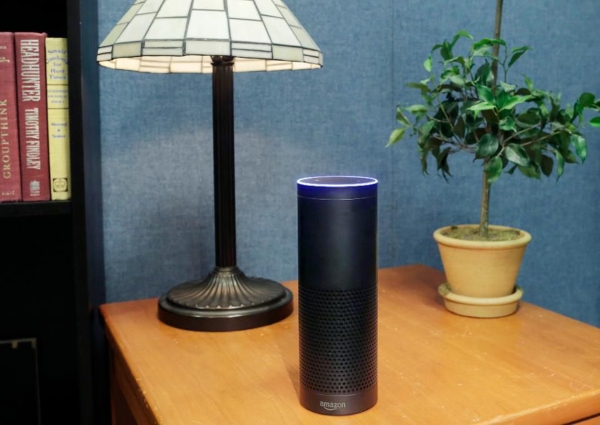[This column from Forbes suggests that as the technology of virtual assistants like Alexa and Siri evolves and they become more capable of evoking effective medium-as-social-actor presence, they’ll take on bigger roles in our lives and disrupt the mundane but important interactions of our human-human relationships (a prospect thoughtfully expanded on in the film Her). ––Matthew]

[Image: An Amazon Echo. (AP Photo/Mark Lennihan)]
Will Virtual AI Assistants Create Real Relationship Troubles?
Kalev Leetaru, Contributor – I write about the broad intersection of data and society.
January 9, 2018
As they say in relationship counseling, communication is everything in nurturing a successful happy marriage. Thus, it was with considerable fascination the other day that I listened as a colleague offhandedly mentioned that his spouse was “jealous” of his new Google Home, to which she promptly replied that it was true and that he now asked the home device all of the casual questions he used to ask her, from tomorrow’s weather to today’s headlines to what time the grocery store closed tonight. The casual back-and-forth banter that cements a long-term relationship was being replaced by an all-knowing AI assistant. What does this suggest about the future of AI in our homes?
Gone are the primitive voice recognition tools of a decade ago that required hours-long training sessions and bizarre speech patterns of speaking a single word at a time and computer-like primitive vocabularies. Today’s voice-controlled AI assistants work instantly right out of the box, can learn to distinguish multiple speakers, understand accents, tolerate background noise and even allow natural speaking tenor.
Not only that but most importantly, they converse back in speech so natural it is nearly indistinguishable from human speech, maintaining the illusion of having a dialog with an intelligent being. Their underlying neural networks are even capable of composing their own rudimentary music.
Today’s smart home hubs like the Google Home and Amazon Echo are far more than voice controlled jukeboxes and lighting controls. They can answer a growing range of questions and through their developer ecosystems, you can do everything from order dinner to schedule an Uber to request fashion recommendations, all by voice.
As home assistants migrate beyond the mechanical basics of MP3 player and light switch, they increasingly play a role in the daily conversation. A discussion with a family member might involve several queries to the home assistant to answer clarifying questions that formerly would have gone unasked or involved a quick search on a smartphone.
We are already a nation of smartphone zombies, even at home. The traditional image of the family dinner with everyone gathered around the table bonding and sharing stories about their days has long ago been replaced in many households with the family scattered to their rooms, each glued to their phone or tablet and plugged into their own parallel universes of information and entertainment.
As home assistants proliferate, it raises the question of whether they will divide us even further. Instead of asking a family member’s advice on what to wear to a dinner this evening, why not leave the decision to an AI system that has access to a complete catalog of the latest fashion trends? Instead of discussing what to have for dinner tonight, leave it to the machine that knows every ingredient we have in the pantry and our complete menu for the past month? Instead of talking about how you and your spouse feel about a major event in the news, ask the all-knowing seer that can summarize what the top thought leaders from across the country have said over the last few hours?
Today’s home assistants are still largely constrained to a simple task or search-oriented behaviors. However, given the uncanny realism of even the most basic Eliza-style chatbots, as advances in neural conversational modeling continue it is only a matter of time before we have digital therapists and digital friends and create digital conversational clones of ourselves that speak and have the same reactions and stories as us. Imagine recreating in digital form a loved one that has passed and being able to have endless conversations with them again as if you were just catching up over the phone. Download an instant dieting coach who can talk you through every difficult moment, or create the perfect digital friend who is always supportive and knows the perfect things to say to you.
Putting this all together, we tend to talk about “sexbots” as being the greatest threat to human relationships from the coming AI revolution, but in reality, even the most mundane AI assistant is becoming ever more conversational in ways that may disrupt our interaction with those around us, much as smartphones have invaded our homes from the family room to the bedroom and turned us into a nation of digital zombies.